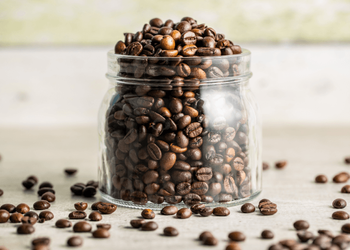
How Does Temperature Affect Taste of Coffee Beans?

Does your coffee taste weak, bland, and different on some days compared to others, despite using the same coffee beans? Then this blog is for you.
One important factor that many overlook is the temperature at which coffee beans are stored, brewed, and roasted.
Temperature plays a pivotal role in the taste profile of coffee beans and highly impacts their flavor, aroma, and overall quality.
Today in this blog I will share with you how temperature affects the taste of coffee beans and will also help you with different ways to find the perfect temperature for brewing and roasting your beans.
So let’s get started.
Does Temperature Affect Coffee Beans’ Taste?
Yes! Temperature has a strong impact on the taste of coffee beans. Moreover, the storage temperature can affect the beans' freshness and flavor profile.
When beans are stored at a temperature that's too high, the aging process becomes faster, leading to stale and flat-tasting coffee.
In contrast, storing beans in too cold environment can also harm their natural flavors, overpowering the vibrant notes that high-quality coffee beans possess.
How Temperature Affects the Taste Profile of Coffee Beans?
Temperature highly impacts the extraction of various compounds from coffee beans, ultimately impacting the taste profile you experience
Lower temperature brewing and roasting:
Lighter roasts
Roasting at lower temperatures (around 400°F) leads to lighter-bodied coffee with bright and subtle flavors. The lower heat preserves delicate volatile compounds, resulting in a more complex and fine taste.
Cold brew
Brewing coffee with cold water (around room temperature) for an extended period extracts fewer bitter compounds, resulting in a smooth, less acidic, and slightly sweet coffee. This method is perfect for coffee lovers who prefer a mellower coffee experience.
Higher temperature brewing and Roasting:
Darker roasts
Roasting at higher temperatures caramelizes the sugars in the beans, leading to a bolder, more intense flavor with reduced acidity. However, excessive heat can also burn the beans, resulting in bitter and bold flavors.
Hot brewing
Using boiling water for brewing extracts more coffee solids, including bitter compounds. It leads to a stronger, but potentially harsh and bitter coffee.
How to define the perfect temperature for coffee beans?
There's no "perfect" temperature for coffee beans, as it depends on various brewing factors:
Desired taste profile
Do you want a bright and acidic coffee or a bold and intense one?
Brewing method
Different methods require different water temperatures for optimal extraction.
Roast level
Lighter roasts benefit from lower brewing temperatures, while darker roasts can handle hotter water.
General Guidelines
For lighter roasts and cold brews: Use cold water (around room temperature) to maintain delicate flavors.
For medium roasts and pour-over methods: Aim for water between 195°F and 205°F (90.6°C and 96.1°C) for balanced extraction.
For darker roasts and French press: Hotter water (around 200°F to 205°F) can be used to fully extract flavor from the darker beans.
Experiment with different temperatures and brewing methods to find what works best for your taste preferences and coffee beans.
Wrapping Up
Temperature is a powerful parameter in coffee brewing. By understanding how temperature affects coffee beans, you can experience a world of flavor possibilities and craft the perfect cup every time.
The heart of brewing exceptional coffee is exploration and experimentation.
That’s all for this exploration. I hope now you know how temperature plays a role in bean taste and how you can use it in your favor to brew a customized cup.
So, now take your favorite beans, adjust the temperature, and experience different flavors with different temperatures.
Also, share your experience with us in the comments below or ping us on Instagram.
FAQ
1) Does grind size affect coffee taste with temperature?
Yes, grind size plays a great role. Finer grinds extract faster at lower temperatures, while coarser grinds require hotter water for optimal extraction.
2) Can I reheat leftover coffee?
Reheating coffee can lead to bitterness and loss of aroma. It's best to brew fresh coffee whenever possible for a better experience.
3) What are some tips for storing coffee beans?
Store coffee beans in an airtight container away from light, heat, and moisture to preserve its freshness and flavor.

I am a coffee aficionado based in Seattle. I have devoted my passion and expertise to perfecting the art of home coffee brewing. I became known for my exquisite pour-over and espresso creations. I source coffee beans from local roasters and explores ...



